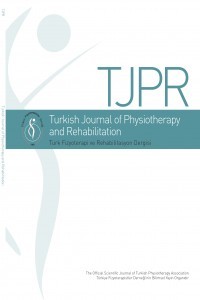COVİD-19 SALGININDA ÖĞRETİM ELEMANI VE ÖĞRENCİLERİN UZAKTAN FİZYOTERAPİ VE REHABİLİTASYON EĞİTİMİNE YÖNELİK ALGI VE TUTUMLARININ İNCELENMESİ
Amaç: COVID-19 salgını sırasında birçok kurum ve öğretim görevlisi derslerini iptal etmek yerine uzaktan eğitim (DE) ile kesintisiz devam etmeye çalışmıştır. Bu çalışma, COVID-19 pandemisinde akademisyen ve öğrencilerin uzaktan fizyoterapi ve rehabilitasyon eğitimine yönelik algı ve tutumlarını incelemeyi amaçlamaktadır.
Yöntem: Bu çalışma, Fizik Tedavi ve Rehabilitasyon Yüksekokulu'nda Mayıs-Haziran 2020 tarihleri arasında gerçekleştirildi. Uzaktan eğitimde görevlendirilen 22 akademisyene çalışma bilgisi verildi ve Uzaktan Eğitim Algı Ölçeği anketi dolduruldu. Öğrencilerin sınıf WhatsApp grupları aracılığıyla 620 lisans öğrencisinin tamamına Web Tabanlı Öğretim Tutum Ölçeği online anket linki gönderildi.
Sonuçlar: Akademisyenlerin DE algısı orta düzeydeydi ve akademisyenlerin çoğu DE'de öğrencilerin analitik düşünme fırsatlarının olmadığını, eğitim kalitesinin artmadığını ve öğrenme çıktılarının geleneksel yüz yüze ile eşdeğer olmadığını belirttiler. Öğrencilerin yarısından fazlası DE’nin "eğitim sorununa" alternatif bir çözüm olabileceğini belirtti. Ancak çevrimiçi derslerdeki teknik sorunlar nedeniyle DE’yi sıkıcı bulduklarını ve kayıtlı oldukları üniversiteye hissetmediklerini de bildirdiler.
Tartışma: Her ne kadar DE pandemi sürecinde eğitim faaliyetlerinin sürdürülmesi açısından alternatif bir çözüm olarak görülse de, hem akademisyen hem de öğrenciler açısından DE'ye yönelik tutumlar belirsizlik yaratmaktadır. Bu durum fizyoterapi eğitiminin pratik ders içeriklerine sahip olmasından kaynaklanabilir. Teknoloji kullanımının daha kullanıcı dostu hale getirilmesi ve kullanıcıların temel teknik eğitimden geçmeleri ile DE’nin kalitesi arttırılabilir.
Anahtar Kelimeler:
Uzaktan eğitim, COVİD-19, Tutum, Sağlık öğrencisi, Fizik tedavi
INVESTIGATION OF ACADEMICIANS AND STUDENTS' PERCEPTION AND ATTITUDES FOR DISTANCE PHYSIOTHERAPY AND REHABILITATION EDUCATION IN COVID-19 PANDEMIC
Purpose: During the COVID-19 pandemic, many institutions and instructors tried to continue without disruption through distance education (DE) instead of canceling their lectures. This study aims to investigate of academicians and students' perception and attitudes for distance physiotherapy and rehabilitation education in COVID-19 pandemic.
Methods: This study was conducted at School of Physical Therapy and Rehabilitation between May to June 2020. Study information were given to 22 academicians be assigned in distance education and Distance Education Perceptions Scale questionnaires were filled. Web Based Instruction Attitude Scale online survey link was sent to through students' class WhatsApp groups to all of the 620 undergraduate students.
Results: Academicians' perception of DE were at moderate level, most of the academicians stated that students don’t have the opportunity to think analytically in DE, the quality of education does not increase and learning outcomes are not equivalent to traditional education. More than half of the students stated that DE could be an alternative solution to the "education problem". However, they found the DE boring due to technical problems and did not feel belonging to the university they were enrolled.
Conclusion: Although DE is seen as an alternative solution in terms of continuing educational activities during the pandemic process, attitudes towards DE create uncertainty for both academicians and students. This may be due to the fact that physiotherapy education has practical course contents. The quality of DE can be increased by making the use of technology more user-friendly and by providing basic technical training for users.
Keywords:
Distance education, COVID-19, Attitude, Health student, Physical therapy,
___
- 1. Ayittey FK, Ayittey MK, Chiwero NB, Kamasah JS, Dzuvor C. Economic impacts of Wuhan 2019‐nCoV on China and the world. J Med Virol. 2020;92(5):473-5.
- 2. World Health Organisation. WHO Director-General’s opening remarks at the Mission briefing on COVID-19. 2020 Available from: https://www.who.int/dg/speeches/detail/who-director-general-s-opening-remarks-at-the-missionbriefing-on-covid-19.
- 3. UNESCO. COVID-19 Educational disruption and response. 2020.
- 4. Balta Y, Türel YK. Çevrimiçi uzaktan eğitimde kullanılan farklı ölçme değerlendirme yaklaşımlarına ilişkin bir inceleme. Electronic Turkish Studies. 2013;8(3).
- 5. Ortiz PA. Teaching in the time of COVID‐19. iochem Mol Biol Educ. 2020.
- 6. Košir K, Dugonik Š, Huskić A, Gračner J, Kokol Z, Krajnc Ž. Predictors of perceived teachers' and school counsellors’ work stress in the transition period of online education in schools during the COVID-19 pandemic. PsyArXiv. 2020.
- 7. Koloğlu TF, Kantar M, Doğan M. Öğretim elemanlarının uzaktan eğitimde hazırbulunuşluklarının önemi. Açıköğretim Uygulamaları ve Araştırmaları Dergisi. 2016;2(1):52-70.
- 8. Özer B. Uzaktan eğitim programlarının öğrenci ve öğretim üyesi görüşleri açısından değerlendirilmesi (Sakarya Üniversitesi örneği). Yayınlanmamış Yüksek Lisans Tezi, Abant İzzet Baysal Üniversitesi, Eğitim Bilimleri Enstitüsü, Bolu. 2011.
- 9. Almarashdeh I, Alsmadi M. Investigating the acceptance of technology in distance learning program. 2016 International Conference on Information Science and Communications Technologies (ICISCT);(pp. 1-5) 2016: IEEE.
- 10. Markova T, Glazkova I, Zaborova E. Quality issues of online distance learning. Procedia Soc Behav Sci. 2017;237:685-91.
- 11. Gormley GJ, Collins K, Boohan M, Bickle IC, Stevenson M. Is there a place for e-learning in clinical skills? A survey of undergraduate medical students’ experiences and attitudes. Med Teach. 2009;31(1):e6-e12.
- 12. Gok T. An evaluation of student response systems from the viewpoint of instructors and students. Turkish Online Journal of Educational Technology-TOJET. 2011;10(4):67-83.
- 13. Erdoğan Y, Bayram S, Deniz L. Web based instruction attitude scale: Explanatory and confirmatory factor analyses. Journal of Human Sciences. 2007;4(2).
- 14. Caron RM. Teaching epidemiology in the digital age: considerations for academicians and their students. Ann Epidemiol. 2013;23(9):576-9.
- 15. Lewis CC, Abdul-Hamid H. Implementing effective online teaching practices: Voices of exemplary faculty. Innov High Educ. 2006;31(2):83-98.
- 16. Goodyear P, Salmon G, Spector JM, Steeples C, Tickner S. Competences for online teaching: A special report. Educ Technol Res Dev. 2001;49(1):65-72.
- 17. Rapanta C, Botturi L, Goodyear P, Guàrdia L, Koole M. Online university teaching during and after the Covid-19 crisis: Refocusing teacher presence and learning activity. Postdigital Science and Education. 2020:1-23.
- 18. Bruce JC, Bond ST, Jones ME. Teaching epidemiology and statistics by distance learning. Stat Med. 2002;21(7):1009-20.
- 19. Kaup S, Jain R, Shivalli S, Pandey S, Kaup S. Sustaining academics during COVID-19 pandemic: The role of online teaching-learning. Indian J Ophthalmol. 2020;68(6):1220.
- ISSN: 2651-4451
- Başlangıç: 1974
- Yayıncı: Türkiye Fizyoterapistler Derneği
Sayıdaki Diğer Makaleler
AŞİL TENDON TAMİRLİ BİREYLERDE CERRAHİ SONRASI UZUN DÖNEM FONKSİYONEL SONUÇLARIN İNCELENMESİ
Fırat TAN, Hande GUNEY DENİZ, Burak ULUSOY, Gülcan HARPUT, Gürhan DÖNMEZ, Mahmut DORAL
Gökhan BAYRAK, Raziye ŞAVKIN, Nihal BÜKER
YILDIZ DENGE TESTİNİ ETKİLEYEN FAKTÖRLERİN ARAŞTIRILMASI
Bensu SÖĞÜT, Gülcan HARPUT, Volga BAYRAKCI TUNAY
